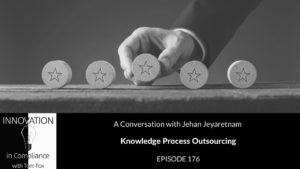
Jehan Jeyaretnam is the Director and Head of Compliance Services at Acuity Knowledge Partners, one of the world’s largest knowledge process outsourcing firms. Jehan leads the Compliance Business Division, supporting clients with regulatory and anti-financial crime surveillance issues. Tom Fox welcomes him to this week’s show as they discuss ways of implementing knowledge outsourcing within work environments.
Knowledge Processing
Tom asks Jehan to define the term “knowledge processing.” Jehan explains that it is a point of view where you have the resources that are supported based on particular specialized knowledge. It’s an area where analytics and judgment reform is required, along with domain understanding and subject matter expertise. It is different from business processing in that it’s more than simply rules-led and considers knowledge offshoring functions.
The Four Pillars of Acuity
Jehan explains that there are four pillars of compliance within Acuity Knowledge Partners. He states that the company supports its clients by combining these four aspects:
- corporate compliance, which focuses on monitoring and surveilling communications and marketing materials;
- investment compliance and trade surveillance supports clients in the areas of investment guideline management from a market abuse perspective;
- anti-corruption financial crimes, which tackles due diligence for clients, transaction monitoring from an anti-money laundering perspective;
- forensic compliance, which takes a data science approach to compliance, while supporting clients who are based on-shore.
The Impact of COVID-19
Tom asks Jehan to explain how his approach to compliance has shifted or changed due to the pandemic. Jehan states that the area that needed to improve due to the pandemic was understanding how to continue supporting clients while maintaining the compliance culture around it. When employees are working remotely, it’s important to ensure that company culture remains embedded. Changing the model so that there’s enough surveillance and approachability is very important. From a business perspective, the pandemic caused Acuity to take more of a conservative approach to the compliance function with respect to budgets. The work volume increased, however, employees operating from their homes allowed for increased communication.
Do More With Less
Companies need to be thinking about processing in the next five years, and how it may evolve. One way that Acuity supports its clients is by helping them do more with less. They create dedicated teams that can support them, by taking away some of the workflows that can be done offshore in a more cost-effective way. Freeing up your onshore teams and employees will allow them to be able to readily adapt to the changing workflows, environments, and operations. Because Acuity has implemented this model, they have provided a certain amount of flexibility in their workforce. Jehan advises other companies to do the same. If you want to increase efficiencies you need to “create a center of excellence” by bringing all the aspects of compliance together.
Resources
Jehan Jeyaretnam | Twitter, LinkedIn
AcuityKP.com


